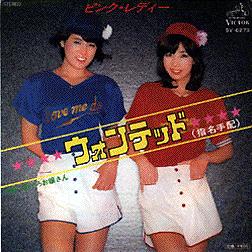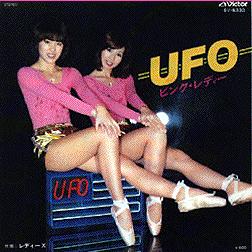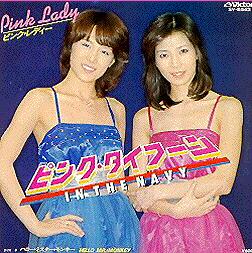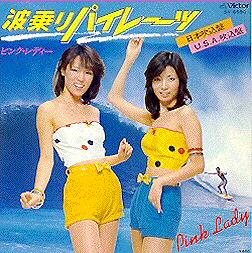ESSAY 2 WAS KOHAKU SOLELY TO BLAME? In Japan, Pink Lady's incredible string of #1 hits came to an end after the Kohaku Uta Gassen debacle. Though they were successful for a few more years, it was a far cry from the "miracle year" of 1978, when everything they touched turned to gold (and/or platinum). However, a closer look at their post-Kohaku singles is interesting for another reason. Kohaku notwithstanding, Pink Lady's style changed quite a bit in 1979. Could this, too, have contributed toward the beginning of the end of this ultra idol duo? Looking at their 1976-78 roster of hits, Pink Lady had two distinct styles: the science-fiction and fantasy style ("UFO", "Chameleon Army") and the strong, aggressive female role ("Carmen '77", "Wanted"), which was quite new to the Japanese pop scene at the time. Even their love songs portrayed them as aggressively pursuing the object of their affections, the sole exception being "S.O.S." All this made Pink Lady seem very fresh and new, like nothing Japan had ever witnessed before. Their dance routines appealed to all ages, as did their sense of humor ("Monster", etc.). Their aggressive sexiness simultaneously made them as attractive to their male fan base as to the young girls who were getting their first taste of feminism in the 1970's. Their sci-fi vibe, so uniquely Japanese, made them seem like gorgeous anime characters come to life on stage. |
|
 |
 |
|||
From the great songs ("Wanted", "UFO") that built Pink Lady's fantastic legend as J-Pop megastars.... |
|
However, looking at their music from 1979 onward, a very different tale unfolds--in the lyrics, that is. Starting with "Jipangu", Pink Lady's strong image was toned down quite a bit. "Pink Typhoon" basically portrayed them as sex objects, and setting this to the tune of the Village People's "In The Navy" made this song even less original; the songwriters didn't even bother creating their own melody? "Nami Nori Pirates", while being a wonderful song, basically tells the tale of a girl letting her boyfriend walk all over her by flirting with other girls...and so on, and so forth, throughout the rest of their single releases. Whether Japanese audiences consciously noticed this or not, one can't help but think they might have subconsciously noticed how Mie-chan and Kei-chan just didn't have the spunk they used to. This also raises an interesting question: Did Pink Lady's lyricists deliberately tone down the aggressive (and, in the case of "Wanted", sometimes racy) lyrics, as a direct result of the Kohaku incident? In a way, it would make sense for Pink Lady's handlers to avoid risking any more public disapproval, after the controversy. |
|
 |
 |
|||
....to the pedestrian records ("Pink Typhoon", "Nami Nori Pirates") that eventually brought them down! |
|
Or, was it a matter of Pink Lady's people getting so wrapped up in the excesses of success (BTW, Mie and Kei saw very little of this wealth), that they were simply making bad career decisions for the girls--starting with Kohaku, and ending with losing sight of the entire concept of Pink Lady? In any case, nothing has ever equalled Pink Lady's domination of the Japanese charts (and virtually everything else!) during the late 1970's. They seemed to be two lovely visitors from a distant planet, who came to Earth for a little while...just long enough to capture millions of hearts with their spirited dancing, and the imaginative flights of fancy in their songs. |
|
|
|